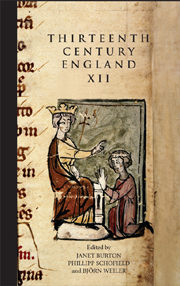Book contents
- Frontmatter
- Contents
- PREFACE
- LIST OF CONTRIBUTORS
- LIST OF ABBREVIATIONS
- The English and the Welsh in Fouke le Fitz Waryn
- Royal Piety in Thirteenth-century Scotland: The Religion and Religiosity of Alexander II (1214–49) and Alexander III (1249–86)
- The 1213 Pipe Roll and Exchequer Authority at the End of John's Reign
- The Public Debate during the Baronial Rebellion
- Richard of Cornwall and the Baronial Opposition in 1263
- Les liens personnels entre les cours de France et d'Angleterre sous le règne de Philippe III, 1270–85
- The Lay Opposition to Edward I in 1297: Its Composition and Character
- Peacekeepers and Lawbreakers in London, 1276–1321
- ‘The peace less kept’? The Origins, Revelations and Impact of Edward I's ‘Trailbaston’ Commissions of 1305–7
- Notes and Documents
The Lay Opposition to Edward I in 1297: Its Composition and Character
Published online by Cambridge University Press: 12 September 2012
- Frontmatter
- Contents
- PREFACE
- LIST OF CONTRIBUTORS
- LIST OF ABBREVIATIONS
- The English and the Welsh in Fouke le Fitz Waryn
- Royal Piety in Thirteenth-century Scotland: The Religion and Religiosity of Alexander II (1214–49) and Alexander III (1249–86)
- The 1213 Pipe Roll and Exchequer Authority at the End of John's Reign
- The Public Debate during the Baronial Rebellion
- Richard of Cornwall and the Baronial Opposition in 1263
- Les liens personnels entre les cours de France et d'Angleterre sous le règne de Philippe III, 1270–85
- The Lay Opposition to Edward I in 1297: Its Composition and Character
- Peacekeepers and Lawbreakers in London, 1276–1321
- ‘The peace less kept’? The Origins, Revelations and Impact of Edward I's ‘Trailbaston’ Commissions of 1305–7
- Notes and Documents
Summary
The year 1297 witnessed a sundering of the political consensus that Edward I had painstakingly built up over the previous quarter of a century, and a splintering of the community of the realm in a way not seen since the Barons' Wars. Edward faced opposition from both the church and the laity on a very large scale, and the crisis has rightly received a good deal of attention from historians. For all this, however, we still do not know very much about those who formed an opposition that the chronicler Walter of Guisborough estimated at 1500 mounted men. Beyond the leaders of the opposition, the earls of Norfolk and Hereford, historians have only the sketchiest idea of who was actually involved, and this has led to an incomplete picture of the opposition's character. This paper argues that in recent years too much emphasis has been placed on the personal grievances of its leaders at the expense of the constitutional element, and will demonstrate that the fundamental clash was instead over what the king could or could not expect from his subjects.
Before coming to the nature of the opposition, it is important for us to know, as far as possible, who exactly was in opposition and who was not. Let us begin at the apex of lay society, the earls. Historians' views on comital attitudes to Edward I in 1297 have been shaped by the observation of the chronicler Pierre Langtoft that Edward had set sail for his controversial expedition to Flanders without a single earl in support.
- Type
- Chapter
- Information
- Thirteenth Century England XIIProceedings of the Gregynog Conference, 2007, pp. 91 - 106Publisher: Boydell & BrewerPrint publication year: 2009



